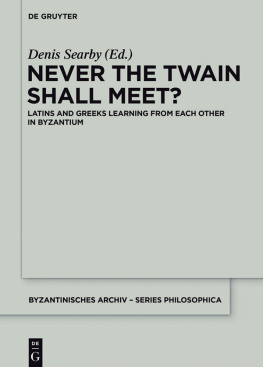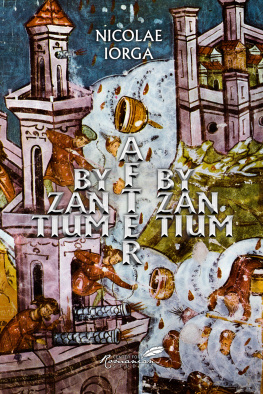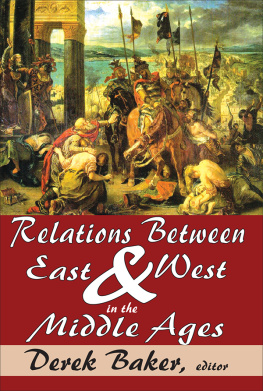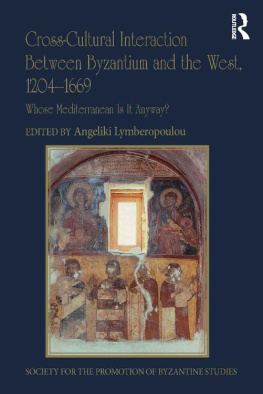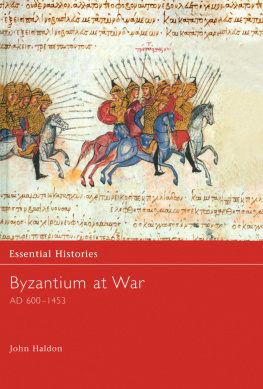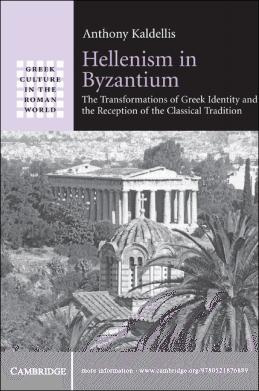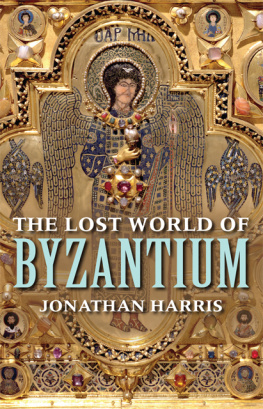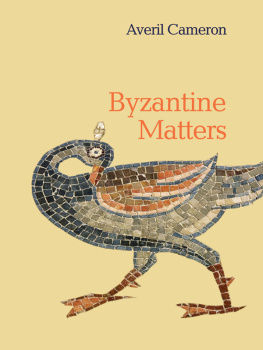Guide
Never the Twain Shall Meet?
Byzantinisches Archiv Series Philosophica
Herau sgegeben von
Sergei Mariev
Wissenschaftlicher Beirat:
John Demetracopoulos, Jozef Matula,
John Monfasani, Inmaculada Prez Martn,
Brigitte Tambrun-Krasker
Band 2
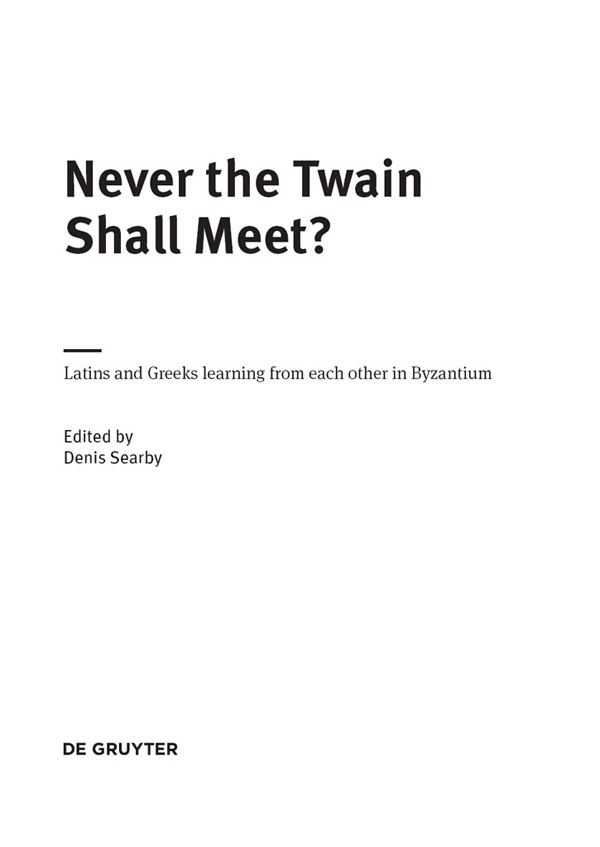
ISBN 978-3-11-055958-3
e-ISBN (PDF) 978-3-11-056107-4
e-ISBN (EPUB) 978-3-11-055973-6
ISSN 1864-9785
Library of Congress Cataloging-in-Publication Data
A CIP catalog record for this book has been applied for at the Library of Congress.
Bibliographic information published by the Deutsche Nationalbibliothek
The Deutsche Nationalbibliothek lists this publication in the Deutsche Nationalbibliografie; detailed bibliographic data are available in the Internet at http://dnb.dnb.de.
2018 Walter de Gruyter, Berlin/Boston
www.degruyter.com
Acknowledgements
This volume would not have been possible without the generous support of the Swedish Research Council ( Vetenskapsrdet ) that funded the Stockholm University conference Never the Twain (June 2426, 2015) which was the basis for the papers collected here. Also to be thanked in this connection are the Harald och Tonny Hagendahls minnesfond which provided additional funding as well as the Department of Romance Studies and Classics at Stockholm University which hosted the conference, and Astrid Sderbergh Widding, the Vice Chancellor of the university, for her words of welcome inspiration that opened the conference. Naturally, the contributing authors as well as the anonymous reviewers are also to be thanked for all their hard work. A special note of gratitude is due to Professor Sergei Mariev, the editor of the Byzantinisches Archiv Series Philosophica , and to his team of highly effective typesetters who worked with impressive celerity once they received the final versions of the papers.
Stockholm, May 2017
Denis Searby
List of Contributors
Panagiotis C. Athanasopoulos , PhD is a research assistant at the Department of Humanities, CaFoscari University of Venice, and a collaborator of the Thomas de Aquino Byzantinus research project (2007). His interests include Christian Literature, and Greek and Latin Medieval Philosophy. Currently, he is working on the Editio Princeps of the Greek Translation of Thomas Aquinas Summa Theologiae I a II ae by Demetrius Cydones and its incomplete Compendium by Bessarion.
Irini Balcoyiannopoulou is a doctoral student at the Department of Education, University of Patras, Greece. The title of her ongoing dissertation is The Logical Handbooks of George Scholarios-Gennadios II: Method, Sources and Innovations . Her research interests focus on the reception of Latin philosophical thought in late Byzantium, mainly its philological and historical aspect. Since 2014, she is a member of the Thomas de Aquino Byzantinus research project.
Marie-Hlne Blanchet , PhD, is a research fellow at CNRS (UMR 8167 Orient et Mditerrane, Monde byzantin) in Paris. Her research focuses on the intellectual and religious history of the Byzantine Empire during the Palaiologan period (13th15th centuries). Among other works, she is the author of Georges Gennadios Scholarios (vers 1400vers 1472): un intellectuel orthodoxe face la disparition de lEmpire byzantin (Paris 2008), and Thodore Agallianos, Dialogue avec un moine contre les Latins (1442) (Paris 2013). She is working on three critical editions within the Thomas de Aquino Byzantinus project, the two Greek translations of Aquinas De rationibus fidei , and two works by Matthew Angelos Panaretos.
John A. Demetracopoulos is Assistant Professor of Philosophy and Theology at the Department of Education, University of Patras, Greece. His main scholarly interests are Greek and Latin Medieval philosophy and theology, with an emphasis on the philological evidence of the Greek-Latin philosophical and theological interaction in the Late Middle Ages and the post-Byzantine era. He is the director of the Thomas de Aquino Byzantinus international research project (2007), currently sponsored by the Stavros Niarchos Foundation. He is the author of numerous scholarly publications, including the monograph (Plethon and Thomas Aquinas, Athens 2004), and the forthcoming The Christian Platonism of Barlaam the Calabrian: In Search of the Theological and Philosophical Sources of His Greek Epistles .
Pantelis Golitsis is Assistant Professor of Ancient and Medieval Philosophy at the Aristotle University of Thessaloniki. He is the author of Les Commentaires de Simplicius et de Jean Philopon la Physique d'Aristote. Tradition et innovation (Berlin & New York, 2008; Prix Zographos de l'Association pour l'encouragement des tudes Grecques en France), of a Modern Greek translation and commentary of Aristotles Progression of Animals and Motion of Animals (Athens, 2017), and of several articles on ancient and Byzantine philosophy. He currently works on a new critical edition of Alexander of Aphrodisias commentary on Aristotles Metaphysics .
Brian M. Jensen is Associate Professor of Latin and a member of the Ars edendi research programme at the Department of Romance Studies and Classics at Stockholm University. His main fields of research include medieval Latin liturgy and hagiography, the Rule of St Benedict, the speeches of Cicero, and the fable genre. He has published numerous works on tropes, sequences and hagiography. His latest publications are The Story of Justina and Cyprian of Antioch as told in a Medieval Lectionary from Piacenza (Stockholm 2012) and the editio princeps of Lectionarium Placentinum. Edition of a Twelfth Century Lectionary for the Divine Office I-IV (Florence 201617).
Rev. Dr. Christiaan Kappes is the academic dean and professor of dogmatics of the Byzantine Catholic Seminary of Ss. Cyril and Methodius (Pittsburgh). His research is focused on the Greek reception of Scholasticism in the fourteenth and fifteenth centuries, especially Trinitarian theology, liturgiology and Mariology. He is working on The Epiclesis Debate: Mark of Ephesus and John Torquemada, OP, at the Council of Florence 1439 for Notre Dame University Press, and on his doctoral thesis The Theology of the Divine Essence and Energies in George-Gennadios Scholarios (at Aristotle University in Thessaloniki).
Michail Konstantinou-Rizos studied at the National and Kapodistrian University of Athens and pursued his doctoral studies at the Royal Holloway, University of London, where he has recently defended his PhD thesis: An edition of Prochoros Cydones (ca. 13301369/71) unpublished Greek translation of Thomas Aquinas Quaestiones disputatae de potentia and Quaestio disputata de spiritualibus creaturis. He is a member of the Thomas de Aquino Byzantinus research project.
Antoine Levy , PhD is a Dominican priest and vice-director of Studium Catholicum in Helsinki, Finland where he moved after undergraduate studies at Sorbonne Paris-IV and ENS (St Cloud) as well as graduate studies at Sorbonne Paris-IV and in Italy (Pontifici Universit San Tommaso dAquino) and doctoral studies at the University of Fribourg in Switzerland. He is an adjunct professor of theology at the University of Helsinki and a professor of Russian Ideas and Religions at the University of Eastern Finland. Among his publications is the monograph Le cr et l'incr: Maxime le Confesseur et Thomas d'Aquin: aux sources de la querelle palamienne (Paris 2006).
Sergei Mariev is an Associate Professor at the Institut fr Byzantinistik, Byzantinische Kunstgeschichte und Neogrzistik of the Ludwig-Maximilians-Universitt Mnchen. He completed his BA in Classics and Classical Civilization at Brigham Young University, Utah, USA in 1996, and later received his Master (2002) and Ph.D. (2005) in Classics, Byzantine Studies and Latin Philology of the Middle Ages from LMU Munich. His Habilitationsschrift with the title sthetische Theorien in Byzanz (2013) explores the reception of the Neoplatonic theories of beauty and the development of image theory in Byzantium. Among his other recent works are Bessarion: ber Natur und Kunst (Hamburg 2015), and Ioannis Antiocheni fragmenta quae supersunt omnia (Berlin 2008). He is the founder and editor-in-chief of Byzantinisches Archiv Series Philosophica .

